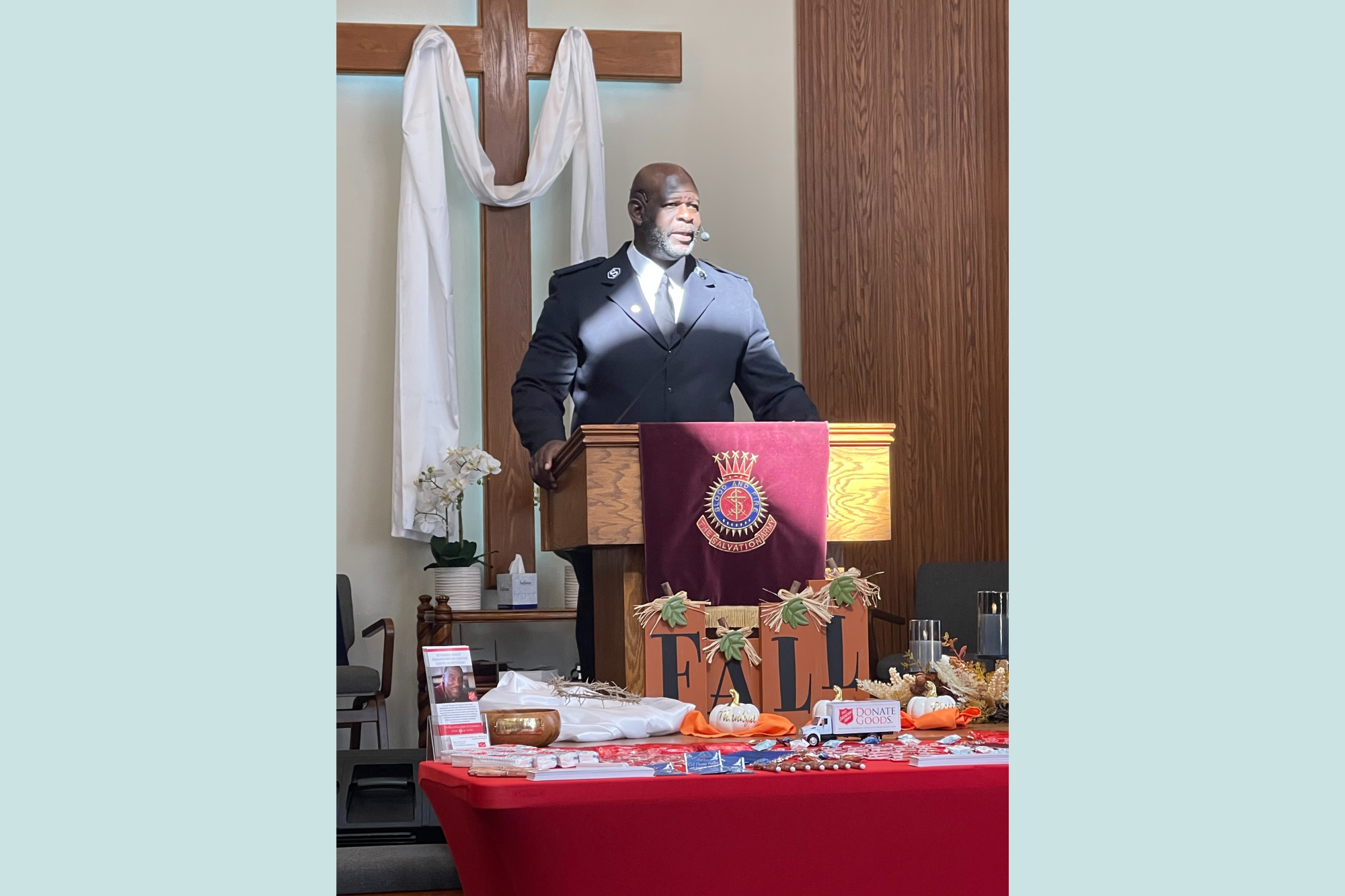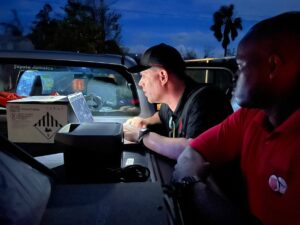Leonard Russell’s journey from NFL stardom to The Salvation Army Adult Rehabilitation Center demonstrates the strength of resilience, faith and the transformative impact of support when rebuilding a shattered path.
After battling addiction for 20 years, former NFL star Leonard Russell found himself losing to drugs and alcohol. He experienced multiple job losses, became distanced from his family and began sleeping in his car.
Russell described it as a situation much different from the life he once lived—and far from the life his family wanted for him.
He grew up in Long Beach, California, where his father introduced him to football at age eight with the goal to keep him away from drugs and alcohol in the community.
Russell developed a passion for the sport and recognized an opportunity to make the most of his talent.
“I had a gift to play the game, and that made it fun,” he said. “I started planning and played it all the way up through high school when I realized I could do something special.”
In 1989, Russell secured a scholarship to Arizona State University and recognized the potential to elevate his football career. He was selected by the New England Patriots in 1991 in the first round of the NFL Draft, chosen as the 14th overall pick.
Russell’s remarkable debut earned him the Associated Press (AP) Offensive Rookie of the Year award in 1991 by achieving 959 rushing yards and scoring four touchdowns while playing for the Patriots.
He played as a running back for six seasons, through 1996, with The Patriots, Denver Broncos, St. Louis Rams, and The San Diego Chargers.
According to Russell, his future looked bright until his second year in the NFL, when he was introduced to cocaine and began abusing drugs and alcohol.
“I allowed myself to go certain places and do certain things that wasn’t how I was raised,” Russell said. “And it wasn’t how God wanted me to be living.”
Caught in a tumultuous struggle with alcohol and drugs, he said he found himself adrift, feeling detached from his sense of self. He said he was at the end of his football career and far from his original plan due to the grasp of addiction.
“They say in addiction, there’s this bottom that you have to hit, and then there’s this trapdoor,” he said. “I was living under that trapdoor for a long time in my addiction.”
After trying on and off to overcome these challenges on his own, Russell found himself in jail in 2017.
After spending a few months in jail, authorities informed him about the possibility of being released into a program where he could find assistance. During his time behind bars, Russell said men around him urged him to consider choosing The Salvation Army Adult Rehabilitation Center (ARC) if he had the chance.
“God intervened in my life at a time where I was at my lowest point. It wasn’t until I got there and just went through this period of healing that I started to realize it wasn’t a punishment, but actually an opportunity for change.” — Leonard Russell
The opportunity did arise and Russell joined 145 other men who were also receiving support and guidance at the Anaheim (California) ARC. These residential programs provide spiritual, emotional and social assistance to individuals who are experiencing a variety of social, emotional and spiritual challenges, including issues relating to substance abuse.
“God intervened in my life at a time where I was at my lowest point,” Russell said. “It wasn’t until I got there and just went through this period of healing that I started to realize it wasn’t a punishment, but actually an opportunity for change.”
Russell said the program’s spiritual component reintroduced God into his life, leading him to read the Bible for the first time. He said this experience aided him in confronting his struggles.
He began to see and hear about how God was working in other men’s lives and realized the same could happen to him, too.
“With The Salvation Army, I started doing some of these things that I used to do under the influence that I never thought I could do sober,” he said. “It gave me hope—it helped me see that I could have a future outside of football and that my life wasn’t over.”
According to Russell, connecting with other individuals facing similar problems was essential to starting his recovery. He explained feeling lost from his identity and needing the support of others to find it again.
“I had this sickness to the disease. I didn’t know how to treat it. But when I came to The Salvation Army, I finally realized that there were more people like me than what I thought,” he said. “The people that God was putting in my life, they were there to help me see things from a different perspective.”
In February 2018, Russell completed the six-month program. He opted to continue into the second phase and took on responsibilities at the front desk of the Anaheim ARC, overseeing intake procedures.
At this point, Russell was sober but found himself healing and eager to better understand substance abuse so that he could impact others.
“Working at the front desk, I was able to see the desperation of family members and of the men coming for help,” he said. “In them, I saw the pain of my parents, my wife and myself.”
This exposure motivated Russell to expand his outreach, and when a position for Resident Manager at the Perris (California) ARC opened, he was all in.
Major Richard Larson, then Administrator at the Perris ARC, conducted the interview and decided to hire Russell for the position.
Larson noted Russell’s display of sincerity, authenticity and consistent commitment to recovery stood out.
“Leonard doesn’t have to sell himself to other people because it just comes naturally,” Larson said. “He recognizes that some people need a little bit of grace—a second chance, and he’s always willing to provide that.”
Larson highlighted that Russell’s persistent support for individuals in recovery extends beyond the program. He consistently sends texts of encouragement and shares Bible verses with program graduates, actively caring for them as a friend.
“He remembers everyone and makes it a point to keep in touch,” Larson said.
After five years as Resident Manager, Russell was offered the position of Chaplain at the Perris ARC. The role placed him as a spiritual advisor, where he can share his testimony and help deliver messages of hope and healing to men entering the program.
Today, Russell remains Chaplain and said he has a new and improved relationship with his wife, family and God.
“The Salvation Army taught me that recovery is a lot better than our addiction,” Russell said. “When I was playing sports, I didn’t live for other people. I lived for myself, and today I live for other people.”
According to Russell, he’s in a new place of understanding so that he can help others understand the complexities of substance abuse from someone who has faced similar challenges.
“I sit out and just be their brother for a minute and allow them to process things and get things off their chest,” he said.
In October 2023, Russell was the keynote speaker at the Riverside ARC Second Chances event, one of a series of such events at various Salvation Army ARCs aimed to raise awareness by sharing personal testimonies and experiences.
“I just try to give back however God sees fit—wherever he puts me at, whoever he sends in my direction, I just try to be a good steward of the things that God gives me today,” he said.
Russell said he feels a sense of responsibility to inspire and uplift others due to the second chance he received in life.
“I share my experience of strength and hope to help other people,” Russell said. “Not to brag about what I’ve been through. Not to brag about what God has done for me, but to give people hope that I know that if I could change, they can change—and this program works.”
Do Good:
- Did you know The Salvation Army served some 24 million Americans last year fighting hunger, homelessness, substance abuse and more? Where can you help? Take our quiz to find your cause and learn how you can join in today.












